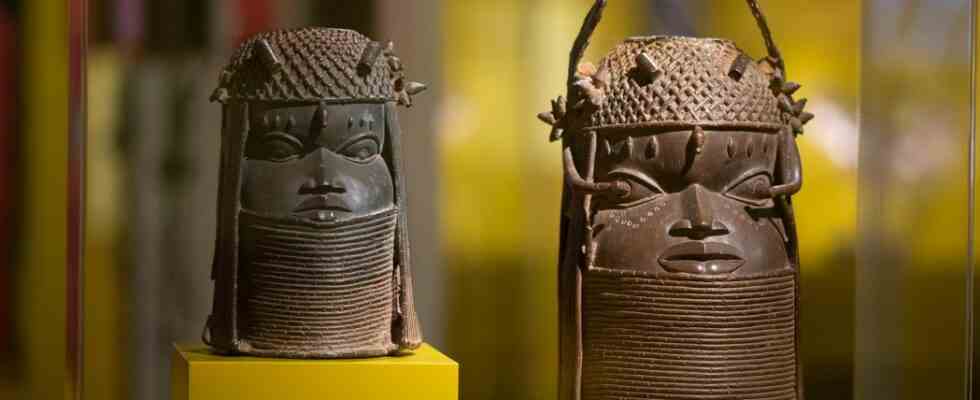Nigeria’s decades-long battle to have the Benin bronzes returned is not yet won. But the country can now celebrate an important stage victory: The five German museums with the largest Benin collections will transfer ownership of all their Benin bronzes to Nigeria, around 1100 pieces. Foreign Minister Annalena Baerbock, Minister of State for Culture Claudia Roth and their Nigerian counterparts will sign a corresponding agreement on Friday in Berlin. The Nigerian ministers are to take two bronzes from the Berlin collection with them. The rest will remain where they are for the time being, but now on loan from Nigeria.
In the past few months, museums and universities from Europe and the USA had restituted individual Benin bronzes to Nigeria. But there has never been a restitution on this scale. It also surpasses the return of 26 works from the Musée du Quai Branly in Paris to the country of Benin last October.
Negotiations with British Museum and Metropolitan Museum “well advanced”
The declaration, which is now to be signed, only affects five houses for the time being: the Hamburg Museum at Rothenbaum, the Ethnological Museum in Berlin, the Cologne Rautenstrauch-Joest Museum, the ethnological museums in Leipzig and Dresden and the Linden Museum in Stuttgart. The transfer of ownership still requires the consent of the sponsors, i.e. the state governments, but Andreas Görgen, former department head in the Foreign Ministry, now Claudia Roth’s head of office and the key figure behind the returns, has already secured this. Gradually, the remaining 15 German museums with Benin holdings are to carry out the restitution.
According to the agreement, Nigerian museum officials will in future be able to decide which bronzes from Germany will be loaned for exhibitions and how they will be presented. This applies above all to the areas of the Humboldt Forum that have yet to be opened, where some of the 400 bronzes from the Berlin collection will be on display from September.
The head of the Nigerian Museums and Monuments Authority, Abba Tijani, praised Germany for the return and said the decision sent a signal to other countries. Discussions with the British Museum and the Metropolitan Museum in New York are well advanced.
Germany is providing financial support for the construction of a new museum in Nigeria
The approximately 5,000 Benin bronzes, most of which are in museums in Europe, have become key objects in the restitution debate. This is partly because of their value and their beauty, which is also accessible to Europeans, and partly because there is no doubt that they were stolen. Virtually all of them come from a single, well-documented looting: the “punitive expedition” of 1897, in which British soldiers stormed Benin City, destroyed the palace of the Oba, the king, and then shipped as many of the sculptures and bas-reliefs to London as they did only could. The punitive expedition was financed in part with the works sold to museums across Europe.
The idea of transferring ownership to the country of origin without necessarily returning the objects physically is new. In this way, the injustice can be ended quickly, even if the museum infrastructure in the country of origin is still lacking. In the case of Benin City, however, this shortcoming is now being remedied, which is also part of the agreement. Germany is providing financial support for the construction of a new museum for the Benin Bronzes and is helping to train the staff.

